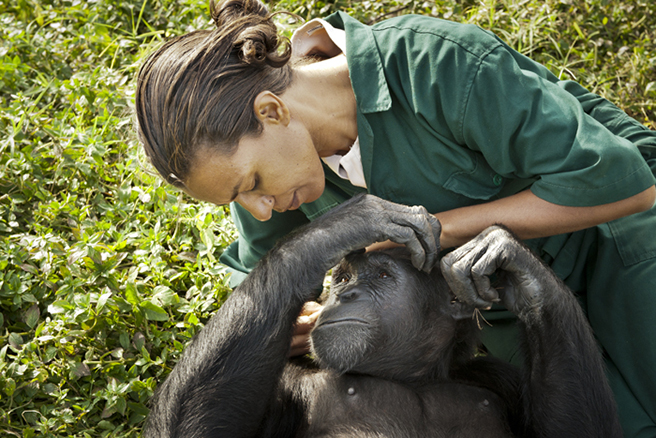Celebrating Women in Conservation on International Women’s Day

International Women’s Day is a global day for celebrating the achievements of women, past, present, and future. It is also a day for highlighting the inequities and challenges which still need to be addressed regarding women’s involvement in all sectors of society.
The African Wildlife Foundation believes that securing greater participation of women in conservation is critical to achieving conservation successes, and it is committed to achieving this end. Its Uganda program team, under the USAID/Uganda Tourism for Biodiversity Program, launched a Women in Conservation project last year. Sarah Chiles (Conservation Management Trainee - class of 2015) is currently posted in Uganda and writes about the importance of securing the participation of women in conservation and the Uganda project’s developments.
It is no secret that a key to developing effective solutions to any problem is looking at it from multiple angles and perspectives. In the same vein, if we are to create a truly vibrant African conservation sector which produces dynamic and effective solutions to our significant conservation challenges, governments and conservation groups need to put in place measures to ensure that we look at problems in multiple and complex ways.
The conservation sector has historically been disadvantaged in this respect given that it has been male-dominated; its systems and cultures still bear the marks of this singular dimensionality and its outputs have undoubtedly been poorer for it. While things are gradually changing, the sector continues to create obstacles for women’s involvement at all levels. Involving women in conservation for gender equality reasons is important in and of itself, but equality rhetoric should not obscure the often unique positions and approaches through which women can bring about meaningful and durable conservation solutions.
Many scholars and practitioners make a special case for women and their connection with the environment. They posture that women, involved in the ‘production of life’, are not only responsible for nurturing families and communities, but the natural world too. As Maria Mies puts it, historically, “women [have] not only collected and consumed what [grows] in nature but they [have] made things grow.” In sub-Saharan Africa, women, by virtue of the gender specific division of labor in rural agricultural societies, have traditional responsibilities as food growers (producing up to 80% of basic foodstuffs), water and fuel gatherers, and care-givers. They are “sylviculturalists, agriculturalists, and water resource managers—the traditional natural scientists,” as Vandana Shiva puts it. While some argue that such “ecofeminist” assertions, which describe women as innate conservationists, are highly essentialist, one cannot escape the fact that most women in sub-Saharan Africa are highly dependent on ecological goods and services to fulfill their roles and livelihoods, and are therefore highly vulnerable to environmental degradation. It follows that many women in sub-Saharan Africa have a unique sense of investment in seeing the environment sustained, and should therefore play a major role in environmental decision-making.
Promoting these sweeping narratives, however real and true, can, however, at best provide highly limited gains in securing greater participation of women in conservation. Amidst these narratives, stories of what individual women are doing and achieving for conservation at different levels of society can be lost. It is often the communication of these stories which offers the most powerful reminders that women are positioned to make lasting conservation impacts, and offers inspiration to an aspiring generation of women conservationists.
For this reason, the African Wildlife Foundation’s Uganda program team, through the USAID/Uganda Tourism Biodiversity Program, is continuing its Women in Conservation project, with a focus on five senior Ugandan women conservationists, and their stories, expertise, leadership roles and capacities. This year, the project has facilitated the establishment of a Women in Conservation Working Group, composed of these five women, which will aim to inform policy and practice in various Ugandan governmental and non-governmental institutions. The project also aims to facilitate the establishment of a mentoring program, through the working group, for recent female graduates looking to become established in the conservation sector.
The five women have diverse stories and are contributing to conservation and community and economic development in Uganda in multiple ways. Dr. Gladys Kalema-Zikusoka, through her founding and directing an organisation called Conservation Through Public Health, promotes biodiversity conservation by enabling people, wildlife and livestock to coexist through improving their health and livelihoods in and around protected areas. Lilly Ajarova, Executive Director of Chimpanzee Trust Uganda, runs a model chimpanzee sanctuary and works to further animal welfare, conservation education and conservation of habitats in unprotected forests in Uganda. Pauline Nantango Kalunda is the Executive Director of Ecotrust—the Environmental Conservation Trust of Uganda—and is a leader in the establishment and management of conservation financing mechanisms, such as Trees for Global Benefit (TGB) which links smallholder famers to the voluntary carbon market. Dr Dianah Nalwanga Wabwire, the Research and Monitoring Coordinator at NatureUganda, takes the lead on research and monitoring programmes in the organization as well as community development projects; she has worked widely on birds’ conservation and community benefit from their conservation. Helen Lubowa, Executive Director of the Uganda Community Tourism Association, works to ensure that conservation efforts are translated into real economic benefits for communities, and women are involved in and benefiting from conservation.
These five women, having broken the mould in many respects to become leaders in a male-dominated sector, act as role-models for young Ugandan women who want to contribute to the conservation of Uganda’s important and diverse natural heritage. AWF is hopeful that, through its facilitatory role in this project, great gains for conservation in Uganda will be realised, both now and in the future.
AWF will be running a series of blog posts on this exciting project. Keep a look out for the next post!
Photo: Barbara Hollweg